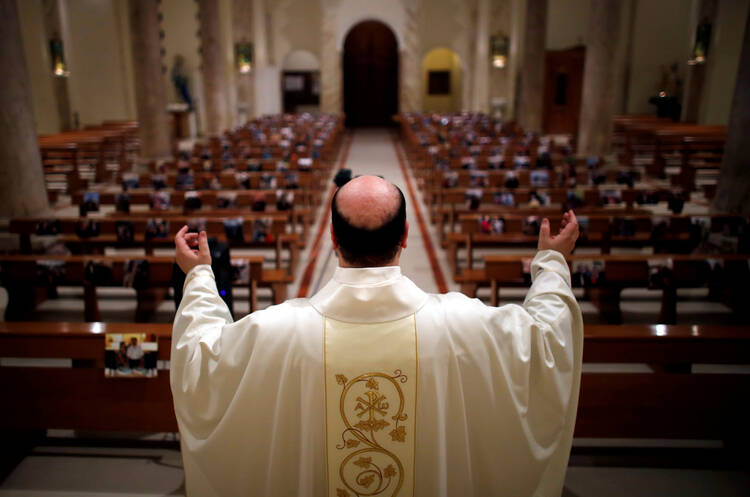Italian Catholics will be able to attend Mass in public beginning on May 18, provided certain norms are respected. This was agreed to on May 7 by the Italian prime minister, Giuseppe Conte, and the president of the Italian bishops’ conference, Cardinal Gualtiero Bassetti, when they signed a protocol governing the reopening of places of worship.
The protocol lays down certain conditions for the celebration of Mass during this period of the coronavirus pandemic. The faithful are obliged to wear face masks and will not be allowed to attend services if their body temperature is higher than 37.4 degrees Celsius (99.6 Fahrenheit). The faithful with coughs or flu are asked not to attend Mass, as are those who have been in contact with persons who are suffering from Covid-19.
The text insists that the norms governing social distancing have to be respected at all times: 1.5 meters (about five feet) from the next person on entering and exiting the place of worship and one meter from the next person during the celebration of the Mass. If the number of those wanting to attend exceeds the capacity of the place of worship then additional Masses will have to be arranged.
Italian Catholics will be able to attend Mass in public beginning on May 18, provided certain norms are respected.
The parish priest will have to determine the total number of persons that can participate in the Mass in respect of the social distancing norms. He will also have to ensure that there are persons (volunteers or collaborators with personal protective equipment like gloves and masks) at the entrance to the place of worship to ensure that the maximum number of persons allowed in the church is not exceeded and to ensure an orderly exit. A notice is to be posted outside the church indicating the maximum number of persons allowed to attend the Mass or other liturgical services.
Gatherings of people at the entrance or exit to the place of worship or in places linked to it are prohibited. It is recommended that the entry and exit doors remain open to avoid the faithful having to touch door handles.
The protocol recommends that the number of celebrants and assistants to the priest is to be reduced to the minimum, and they, too, have to respect the social distancing norms at all times. It allows the presence of an organist but not a choir. Hymnals and Mass guides are to be omitted.
Collections are not to be taken during the Mass; the faithful can place their offerings in collection boxes.
Collections are not to be taken during the Mass; the faithful can place their offerings in collection boxes located at the entrance to the place of worship or in some other suitable place. Holy water fonts are to remain empty, and the sign of peace is to be omitted.
The protocol asks that special provisions be made for differently abled persons, particularly in relation to seating.
For the distribution of Communion, the celebrant or the extraordinary minister of the Eucharist has to sanitize their hands and wear gloves and a mask. They must take care not to touch the hands of the faithful in the distribution of Communion.
The protocol suggests that when the indoor place of worship is not adequate for the celebration of Mass in accordance with these norms, then the bishop should evaluate the possibility of celebrations in the open air but always respecting social distancing and other norms.
For the distribution of Communion, the celebrant or the extraordinary minister of the Eucharist has to sanitize their hands and wear gloves and a mask.
It also reminds the faithful that they are dispensed from the obligation of attending Mass for age or health reasons.
It recommends that those who cannot attend can follow liturgical celebrations online. The protocol states that these regulations are to apply to other celebrations besides the weekly Mass, including baptisms, weddings, the anointing of the sick and funerals.
It emphasizes that the sacrament of reconciliation is to be administered in a large, airy space, while always respecting social distancing norms and the requirement to wear masks and gloves.
According to the protocol, the celebration of confirmation is postponed.
The protocol insists that the places of worship, including the sacristy, have to be regularly sanitized at the end of every celebration. Likewise, the vessels and other objects used at the celebration have to be carefully disinfected.
Cardinal Bassetti emphasized that the protocol “is the fruit of an in-depth collaboration and synergy between the government, [its scientific advisory council] and the Italian bishops conference, where each one played its part in a responsible manner.” He said the church was committed to making its contribution to overcoming the present pandemic crisis.
Prime Minister Conte said, “The measures for safety envisaged in the text express the most suitable [practices] to ensure that the recommencement of the liturgical celebrations with the people take place in the safest way.”
He thanked the Italian bishops’ conference “for the moral and material support it is given to the entire national collectivity in this difficult moment for the country.”
A similar agreement has been reached with the other religious communities, the minister of the interior, Luciana Lamorgese, who was also present at the signing of the accord, said.










